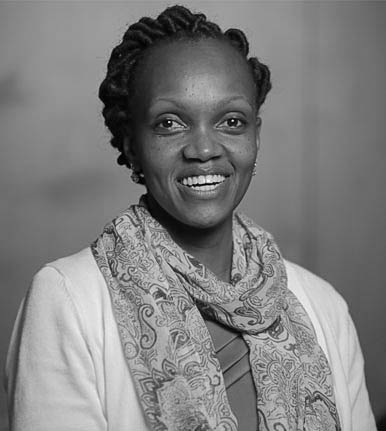
Ivy Kombe
Supervisors
Prof. James Nokes

Prof. James Nokes
 Email : JNokes@kemri-wellcome.org
Email : JNokes@kemri-wellcome.org James Nokes is Professor of Infectious Disease Epidemiology at the School of Life Sciences, University of Warwick. Since 2001 he has been based full time at the Wellcome Trust Major Overseas Programme, Kilifi coastal Kenya. James trained in Zoology (BSc) followed by a PhD in virus epidemiology. His principle interests are the transmission dynamics and control of human viral pathogens, including respiratory syncytial virus and rotavirus. The focus of his WT Senior Investigator Award is the integration of epidemiological and genomic data to infer transmission pathways at different scales of interest from the household to countrywide. His research group is inter-disciplinary using molecular, phylogenetic, immunological, mathematical, statistical and field approaches to address key questions relating to respiratory and enteric virus persistence, transmission, and intervention.


Dr. Marc Baguelin
Affiliation(s):
London School of Hygiene & Tropical Medicine, UK
I am a mathematical modeller working at the Immunisation department at Public Health England and at the London of Hygiene and Tropical Medicine with Prof. John Edmunds on models of influenza transmission, immunisation and control.
After graduating from the Ecole Centrale de Lille with a MSc in Control engineering from the University of Lille in 2000, I completed a PhD in 2003 on modelling the co-evolution of populations of bacteria and phages. In 2004, I took a position as Research Associate to work in collaboration with the Animal Health Trust, Newmarket, analysing data from equine influenza. I first joined the department of zoology at the University of Cambridge and subsequently the Cambridge Infectious Diseases Consortium in the Department of Veterinary Medicine, following its creation in 2005. I developed a model of transmission of equine influenza including new techniques to infer parameter estimation from sparse data. The model helped to understand the role of compulsory vaccination in changing the dynamics of the equine influenza viruses following the introduction of compulsory vaccination for racehorses in 1981.
In January 2009, I joined the Health Protection Agency (now Public Health England), UK to work with Profs Miller and Edmunds on the modelling and economical evaluation of immunisation policies in the United Kingdom. During the outbreak of pandemic influenza virus in the United Kingdom, I was part of the team of scientists who provided early results to assess the transmission in the United Kingdom. In particular we developed algorithms to integrate epidemiological information with the temporal dynamics of the virus in order to improve estimation of the effective reproduction ratio of the disease. In order to inform vaccination policy decisions with the newly developed pandemic vaccine, I developed with colleagues a model to assess in real time the impact of vaccination strategies. This model incorporates a transmission model fitted to the epidemiological data with health care costs and savings applied to the disease burden. This model was developed and published in real time during the outbreak.
I am also an enthusiastic photographer. Some of my recent work can be seen on my personal website.


Prof. Graham Medley
Affiliation(s):
London School of Hygiene & Tropical Medicine
I joined the Social and Mathematical Epidemiology group at LSHTM in April 2015, after 21 years at the University of Warwick, and 10 years at Imperial College before that. I moved to the faculty of Public Health and Policy and the Department of Global Health and Development because I have become fascinated by the interaction between infectious disease and the economic, social and political spheres.
My interest is the transmission dynamics of infectious disease, and I have published on many different pathogens and hosts – see [Google] or [ORCID] or [ResearcherID] for a full list. I am particularly interested in understanding how interventions are and should be designed to control infectious disease; and my definition of “interventions” includes both the biological (e.g. immune response) and societal action (e.g. immunisation).
I am on the Board of Reviewing Editors for Science, a handling editor for Mathematical Biosciences, and a Joint Editor for Epidemics.
Mentors
Dr. Evelyn Gitau

Dr. Evelyn Gitau
Dr. Evelyn Gitau is the Director of Research Capacity Strengthening. Under her direction, the division will continue to grow its signature fellowship program, the Consortium for the Advancement of Research Training in Africa (CARTA), and expand opportunities across the continent for African scholars to become great research leaders.
Dr. Gitau’s most recent role was as a program manager at the African Academy of Sciences, where she stewarded the Grand Challenges Africa at the Academy under the Alliance for Accelerating Excellence in Science in Africa (AESA) program. Prior to that, she was part of the team at the KEMRI-Wellcome Trust Program in Kilifi, Kenya, conducting research on developing biomarkers of disease among seriously ill children.
Dr. Gitau earned her PhD in Life Sciences from the Open University/Liverpool School of Tropical Medicine in the UK, investigating neurological infections in children living in malaria-endemic areas. She has more than 15 years of experience in medical research.
Among her awards and accomplishments include a 2015 appointment as a fellow of the Next Einstein Forum, where she is the ambassador for the development of Science, Technology, Engineering and Mathematics in Africa.
Dr. Gitau’s vast networks have brought her positions on numerous advisory boards for organizations advancing the agenda of research and evidence generation in Africa. These include the Independent Scientific Advisory Board (ISAB), Malawi-Liverpool-Wellcome Trust Clinical Research Programme College of Medicine, Blantyre, Malawi, University of Oxford (MSc International Health and Tropical Medicine) and and the Investment Committee Grand Challenges Canada. She will remain a member of the Steering Committee for Grand Challenges Africa.


Dr. Martin Rono


Dr. Benjamin Tsofa
Dr Tsofa is the Center Director for the KEMRI Centre for Geographic Medical Research – Coast. Tsofa trained in Dental Surgery at the University of Nairobi, and in Leadership and Management at KIA and MSH. He moved to Kilifi in 2004 as a clinical dentist, was appointed Deputy Hospital Superintendent in 2005, and then as District Medical Officer of Health for Kilifi District in 2006. As DMOH, working closely with Prof Marsh and Dr Peshu, he set up the KEMRI/MOH District Managers group and drafted the Programme’s MOH engagement policy guidelines. Tsofa took study leave from the Ministry and joined the Programme in April 2009 to coordinate the interactions of the Programme and the two ministries of health in Kenya.


Prof. Philip Bejon
 Email : PBejon@kemri-wellcome.org
Email : PBejon@kemri-wellcome.org  Phone : +07-5555-565
Phone : +07-5555-565 I first came to Kilifi in 2002 to conduct Phase I and IIb clinical trials of a candidate malaria vaccine based on viral vectors. I returned to the University of Oxford in 2006 to complete specialist clinical training as a clinical lecturer, and then was appointed as a senior fellow in the NIHR Oxford Biomedical Research Centre. These posts allowed me to remain active in malaria research, leading further trials of GSK’s candidate malaria vaccine “RTS,S”, and as a member of the Malaria Vectored Vaccine Consortium funded to test viral vectored malaria vaccines in several sites in Africa including Kilifi. An MRC Clinician-Scientist Fellowship, allowed me to return to be resident full-time in Kilifi in 2013, and I became Executive Director of the KEMRI-Wellcome Trust Research Programme in September 2014.
Ivy is part of the Viral Epidemiology and Control (VEC) research group at KEMRI-Wellcome Trust. Her work involves modelling the transmission of infectious diseases. She has a Masters in Epidemiology from Imperial College London and a Bachelor of Science in Mathematics from the University of Nairobi. Her PhD project is focused on trying to understand the spread of respiratory syncytial virus (RSV), an important viral cause of pneumonia, within households. The project aims to find generalizable insights about the pattern of infection spread that can inform and help to optimize intervention strategies.
- 51
- 66
- 48
- 104
- 44
- 423

